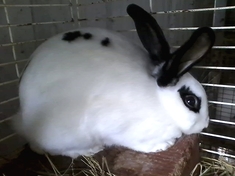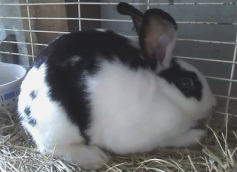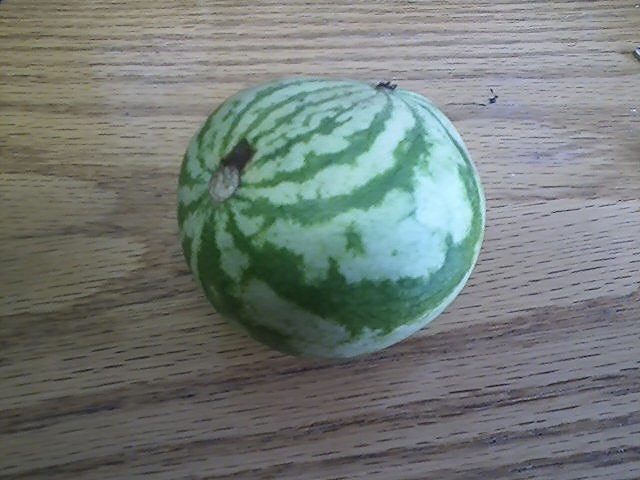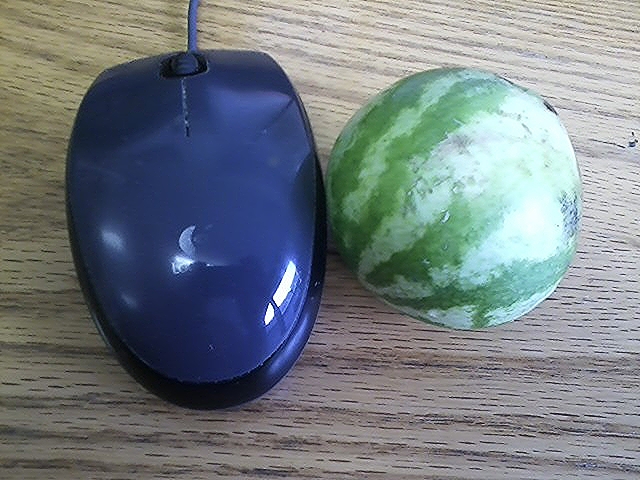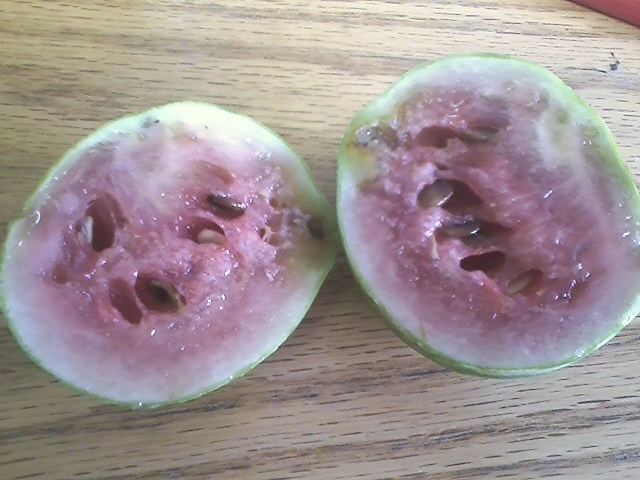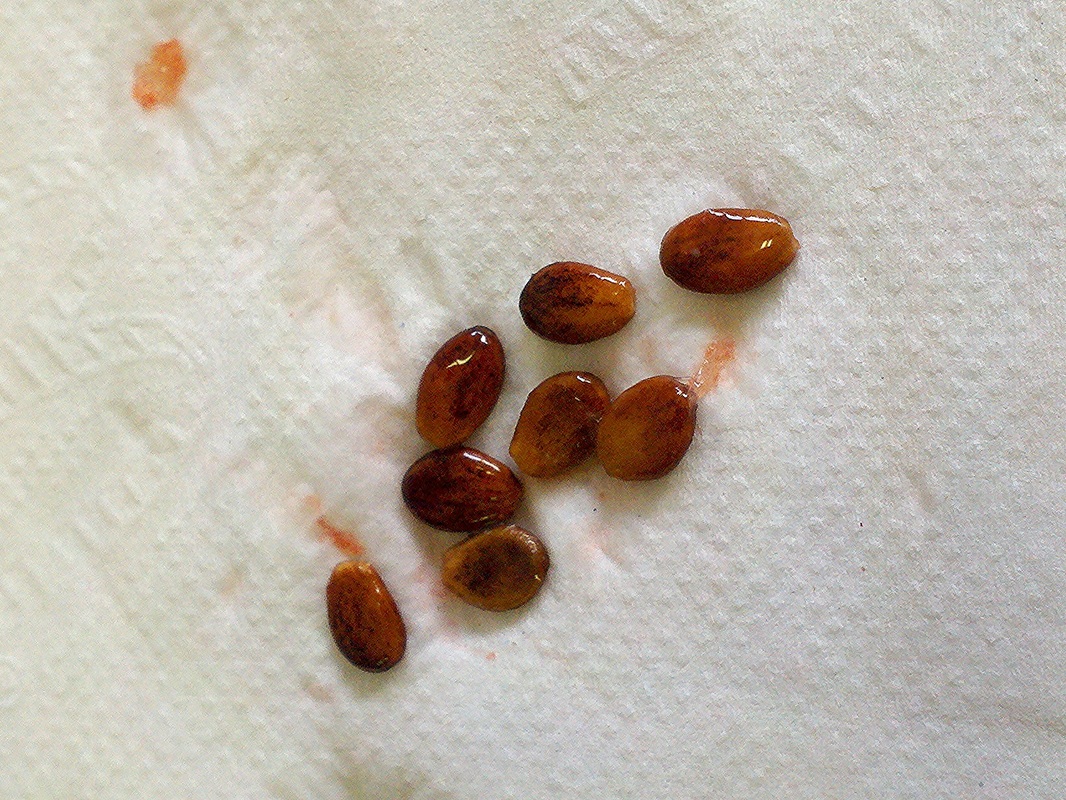| Fiona and Darcy are the founding matriarchs for my future satin herd. Fiona is the charlie doe on the left, and Darcy is the broken doe on the right. They are still a little too young to breed, so there won't be any baby pictures any time soon, but I have high hopes for these fine gals. | 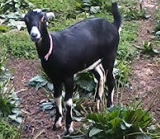 Our newest caprine resident is the awesome girl you see here. We're still tossing name ideas around but we do have a few ideas. She is a nubian - lamancha cross, from good milking bloodlines and show quality parentage. She is still a little standoffish, as she learns about her new surroundings and finds her place in the herd, but she is friendly and curious, which I see as good signs that she will come around soon. |
|
Wildflower Valley Farm welcomed some new residents recently.
0 Comments
Yesterday I discovered a curiosity that appears to be a miniature watermelon! A short google search brought me to this website, which really discusses the research that the University of California has done more than the actual melons themselves. It seems that the tiny melons pictured on that page are seedless hybrids. My discovery however, clearly had seeds. And I don't know about you, but those seeds sure look like mature seeds to me. The melon was much too ripe (almost to the point of rot) for me to taste it. It smelled very sweet, with that icky, beyond-its-prime over-sweet smell that rotten fruit can have. Needless to say, I wasn't brave enough to even lick it, so we will all just have to wonder about the flavor. But since it looks like a watermelon, and smelled like a watermelon, I'm going to guess that it tasted like watermelon (yeah, I know, I'm a genius). You better believe, I'm saving these seeds. Next spring, I will try to sprout them and see what grows! Are you familiar with this type of watermelon (the seeded sort in particular)? I welcome any information about it that you have to share! Disclaimer:
None of the information contained on this site is intended to diagnose, treat, or otherwise substitute for the care and advice from a qualified human or animal medical professional. Please consult the trusted medical professional of your choice before using any of the information contained on this site. The results are in! More than 100 people have participated in the survey, and while it may or may not be a good representation of goat owners nation-wide, I do feel that it is a good representation of local goat owners since most of the responses came from Tennessee and nearby areas. I think the results speak for themselves, so rather than analyzing the minor details for you, I will simply share the results with you. You can view them by clicking here. I did find some of the text responses interesting, especially the various answers for why each participant feels that their deworming practices are or are not working. The vast majority of you are confident in your deworming practices. Those who are not, have experienced the same conditions I have this summer, and blame the increased wet weather with creating ideal conditions for parasite proliferation. This means that we must be even more vigilant in parasite prevention and, if necessary, consult a medical professional for advice. A great many of you stated that you use fecal testing to verify the effectiveness of your deworming practices, which is, in my opinion, the best way to verify the size and type of worm load your goats may be carrying. I must confess a tiny bit of jealousy however, for those of you who are able to do your own fecal testing. A good microscope is definitely on my wish list. **Deworming Update** As I described previously, I have struggled with worm prevention in my herd this year. The first fecal confirmed my suspicions that my usual dewormer choices were not working the way they have in years past. This was a bit unnerving because I was already using what is widely accepted in my area to be the most effective deworming drug. My vet asked me to try Valbazen, which is something I have not previously used in my own herd, but I know it to be popular among sheep breeders in my area. The follow-up fecal showed a vast improvement, and confirmed that the Valbazen worked quite well. I am now adding this to my arsenal. For those of you who may be unfamiliar with it, Valbazen is the brand name for a drug called albendazole. If that sounds familiar, it is because albendazole is in the same drug family as fenbendazole, otherwise known as Safe-Guard or Panacur. This might explain why I have not attempted the use of Valbazen previously. My past experience with fenbendazole was a very bad experience and, on the advice of the medical professionals I consulted at that time, I discontinued use of fenbendazole. The receptionist at my current vet's office however, explained to me that they are finding fenbendazole to be effective in goats however, the dose required is double what is indicated on the product label. Armed with this new knowledge, I may consider giving fenbendazole a second chance. Knowing that parasites are constantly changing and adapting to whatever we throw at them, I am willing to have an open mind. I am willing to try both new things, and old things in new ways. Knowledge, combined with vigilance however, is key. I'm sure it annoys the heck out of everyone I know, but I ask a lot of questions and must always know "why?" If this is not already your common practice, I highly recommend that you consider adopting it - to empower yourself. Disclaimer:
None of the information contained on this site is intended to diagnose, treat, or otherwise substitute for the care and advice from a qualified human or animal medical professional. Please consult the trusted medical professional of your choice before using any of the information contained on this site. |
AuthorHi, my name is Nicole and my friends think I'm crazy. I love farming, and my methods can be non-traditional at times, but I love simple living, I love playing in the dirt, and I love life. Disclaimer:
None of the information contained on this site is intended to diagnose, treat, or otherwise substitute for the care and advice from a qualified human or animal medical professional. Please consult the trusted medical professional of your choice before using any of the information contained on this site. Archives
May 2018
Categories
All
This website contains "affiliate links" where appropriate. I may earn a small commission or referral fee on your purchase, however this has no effect on your price. It is purely a cost of doing business for the vendor companies. The monies earned help maintain and support this website and free content. Unless otherwise noted, all content on this website is © Nicole Oatney and unauthorized duplication or distribution is expressly prohibited.
“Nicole Oatney is a participant in the Amazon Services LLC Associates Program, an affiliate advertising program designed to provide a means for sites to earn advertising fees by advertising and linking to amazon.com.”
|

